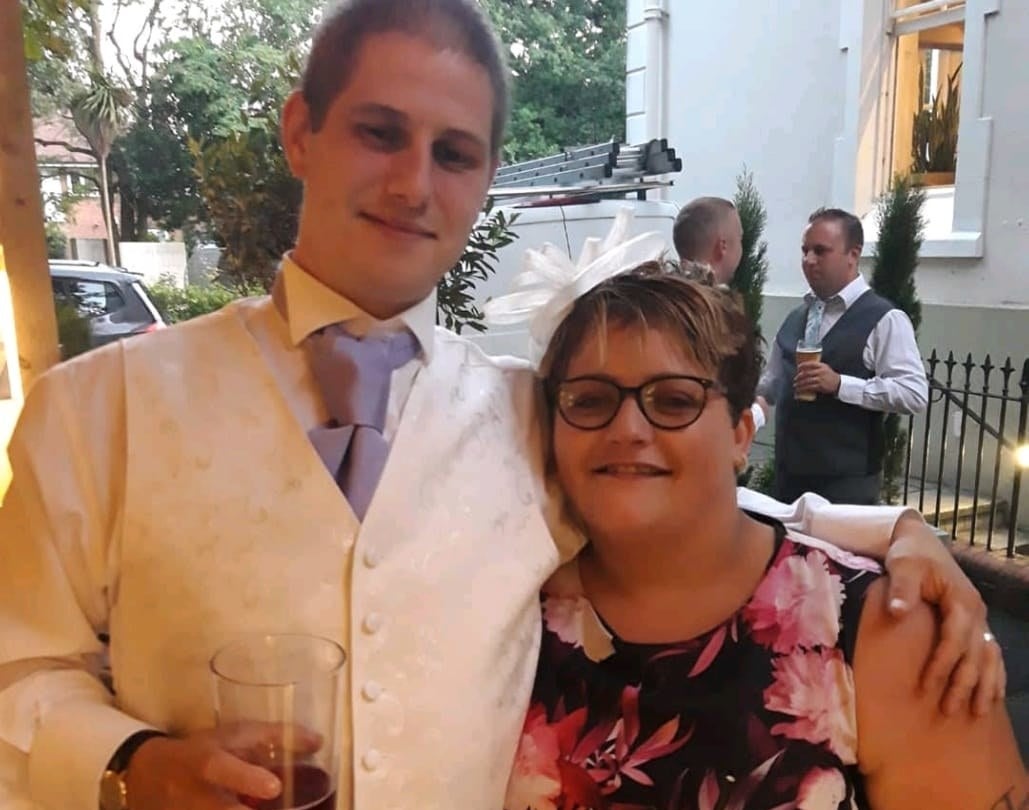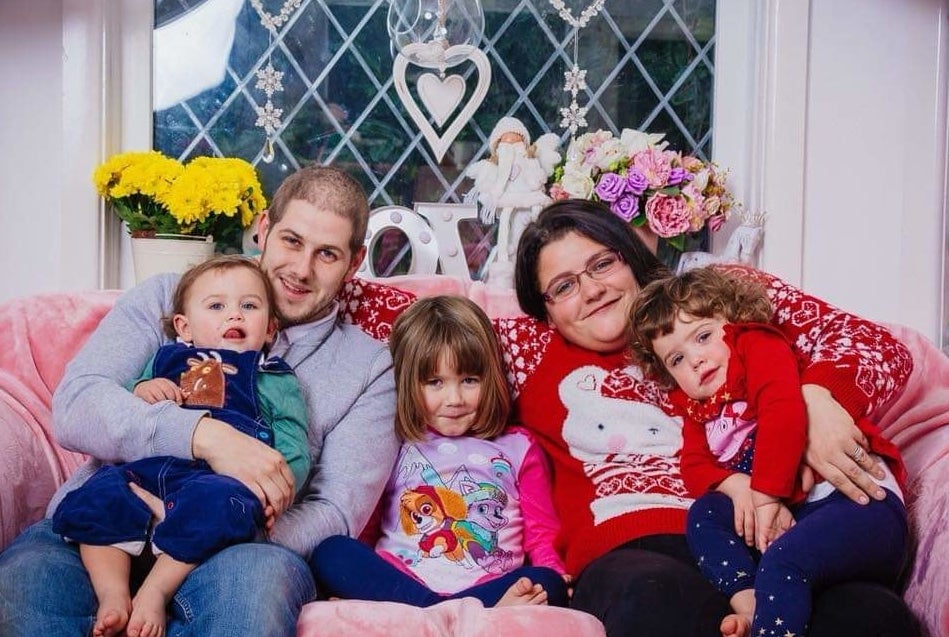
The journalists at BuzzFeed News are proud to bring you trustworthy and relevant reporting about the coronavirus. To help keep this news free, become a member and sign up for our newsletter, Outbreak Today.
It had been a week since her husband was furloughed from his job at an automotive parts warehouse in Dorset, and now Alison Russ, 27, was contemplating how their family of five would survive the second major economic crisis of their young working lives.
“What else could we take off it?” Ali said, studying a list of the family’s outgoings at the kitchen table of their rented home in Poole, but the questions that were troubling her were bigger than how to squeeze more savings out of an already strained monthly budget.
Her husband Terry, 29, had been asked by his employer — a small private company with about 30 staff — to move onto the government’s emergency coronavirus job retention scheme for at least a month while it scaled back because of COVID-19. The family’s sole salary-earner, Terry was now among the estimated 9 million nonessential British workers at home on furlough wondering how long it would be before they got back to work again.
This month, because of chancellor Rishi Sunak’s extraordinary move to forestall an all-out economic collapse, 80% of Terry’s usual £1,450 take-home salary would be paid by the British state. The Russes were hoping the other 20% would be made up by an increase in the monthly universal credit payment they claimed because Ali is too unwell to work, and which accounted for roughly half their income.
Beyond this month, the Russes said, Terry’s income was up in the air. They weren’t sure that his employer could continue trading if the lockdown continued for much longer, or if it could afford to retain him if it did. And that was a deeply unnerving feeling when they were already struggling to make ends meet.
“I still feel a bit scared, to be honest,” Ali told BuzzFeed News, in one of several lengthy conversations with the couple over the past month.
How would they afford to live if Terry couldn’t work? Would they become homeless? Would their kids end up in foster care if they couldn’t afford to look after them? These were the questions that occupied Ali as she sat in the kitchen of the three-bedroom private rental they moved into last month, just before the lockdown.
Surrounding her in the downstairs rooms were toys and clothes belonging to their three children — they have two daughters, aged 6 and 4, and a 3-year-old son — but Ali hardly needed reminding of what was now at stake for her young family. She and Terry had been through their share of adversity.
The Russes grew up near Bournemouth, left school after getting mostly Ds in their GCSEs, and joined the workforce in low-paid jobs in the aftermath of the last serious economic downturn: Ali in social care, Terry fitting roller shutter doors. They met at a New Year’s Eve party in 2011, got married four years later — and in the years they’d been together there were nights they went hungry because they couldn’t afford food. There were times they had to borrow money from payday lenders or relatives just to cover their bills.
In the months before the outbreak, the Russes had been feeling better about their finances than they had for a long time. With outside help, they’d been learning to manage their money. Ali had entered an individual voluntary arrangement (IVA), a formal alternative to bankruptcy that allowed her to repay her creditors more slowly, and they’d become more watchful of their spending.
But it was still tight from month to month, and they were sorely unprepared for a sudden financial shock. They were £16,000 in debt, and, like a quarter of British adults, they didn’t have enough savings to last more than a month if they lost their main source of income. They had £39 in the bank.
The challenges that the Russes are confronting are representative of what millions of British families will experience in the coming months as a public health emergency mushrooms into an economic crisis.
Experts say it’s too soon to know the economic cost of the coronavirus outbreak, but it could lead to millions of job losses and add tens of billions of pounds to government borrowing. Its impact will be felt for years in lost earnings and reduced living standards. And while politicians talk about COVID-19 not being discriminating, it’s clear that the economic suffering it inflicts will not be evenly distributed.
The Russes, while a lower risk medically because of their age, fit into several categories that are most exposed to the virus financially: The young and workers on low incomes are disproportionately likely to be furloughed or laid off because of the pandemic, economists say, and are in a worse position than other groups to weather the coming storm.
Despite years of employment growth under the Conservatives, many people entered the crisis in precarious circumstances — stranded in poorly paid, insecure jobs with little safety net below them and a tenuous housing situation. Around 14.5 million people in the UK were living in poverty before the pandemic, the highest number since the 1960s, according to the Joseph Rowntree Foundation, an anti-poverty think tank, and they will face severe hardship in the months ahead even with the government’s emergency measures.
The Russes, for all their financial struggles, are only on the borderline of the foundation’s definition of poverty — which means their story is far from exceptional.
“There are people worse off than us,” Ali said, her voice rising now. “How are they going to pay their council tax? How are they going to pay their rent?” She crossed her arms, sinking her fingers into her armpits. It upset her to think about it.
“It’s not fair for people who’ve always worked so hard every day in their life,” she said.

On a Friday in March, not long after Boris Johnson ordered everyone but essential workers to stay at home because of the coronavirus, Terry’s manager told him not to come back to work the next week. The warehouse had initially stayed open after the government ramped up social distancing measures, but business dried up and it wasn’t clear when it would return. So Terry went home and waited.
His boss called a few days later.
It was about 4:30 in the afternoon when the call came, as Terry recalled. The kids were playing upstairs, having not long got home from school. The Russes’ daughters attended a school in the Dorset village where they lived until last month, and it remained open for the children of key workers and children considered vulnerable. The Russes’ kids fell into the latter category, and so twice a day during the lockdown they’d been making the 50-minute round-trip from Poole in their Renault Scenic. Terry didn’t have a licence, so Ali drove.
Terry, ordinarily laid-back, felt a rush of panic as he stepped into the living room to take the call. He’d watched TV news reports about the retailer BrightHouse collapsing into administration, and the interviews with distraught employees brought home to him what a bad time it was to lose your job. It might be months before companies were hiring again. But what if his boss was calling to tell him the company is closing?
He wasn’t. According to Terry’s account of the conversation, his management was trying to keep the company alive, to save jobs, but to do that they needed urgently to cut costs. They’d examined the government’s new coronavirus job retention scheme and decided to furlough Terry. An email would follow with a description of the terms and a contract for Terry to sign.
“Is everything all right?” Ali asked when he hung up.
Terry wasn’t totally sure what it all meant, so he went to their computer, a hand-me-down from a relative, typed “furlough” into a search engine and clicked on a link to the government web page describing the new scheme.
“If you cannot maintain your current workforce because your operations have been severely affected by coronavirus (COVID-19), you can furlough employees and apply for a grant that covers 80% of their usual monthly wage costs, up to £2,500 a month,” Terry read, slowly absorbing the details of how the Tory government was proposing to shore up the incomes of millions of people whose jobs were now under threat.
The Resolution Foundation had welcomed the chancellor’s intervention as “absolutely vital” to support households and businesses. The Institute for Fiscal Studies calculated that the three-month scheme would mean furloughed workers like Terry would, on average, lose 13% of their incomes if they lost their jobs because of the virus rather than 53% if the government had done nothing.
For Terry, it was reassuring that, for now at least, he still had a job.
“Are you absolutely sure you understand everything in that letter before you send it back and say you’re happy?” Ali said.
Terry said he was, although he wasn’t sure how being furloughed would affect their universal credit payments.
The Russes received £1,535 a month from the streamlined benefit system, and it was vital to supplement Terry’s salary. Ali had quit her job in a care home because she was struggling with her mental health nearly two years ago. Although it didn’t sit well with either of them to depend on the government for support, they didn’t have an alternative until Ali was well enough to go back to work.
Terry assumed the universal credit payment would automatically increase to cover the £300 a month he was about to lose from his pay, that HMRC would notify the Department for Work and Pensions without him having to do anything, but he couldn’t find anything in the government guidance addressing that point. Even if their entitlement did increase, Terry didn’t trust that the money would actually hit their account in time. The universal credit system was notoriously riddled with delivery problems, of which the Russes were painfully familiar.
Last April, they were unfairly docked £1,300 because of an administrative mistake. Terry’s monthly salary had been paid earlier than normal because of the Easter holidays and because he received two pay packets in a single universal credit assessment period, the system automatically reduced their payment the next month. The Russes had to borrow money from Ali’s father to cover their expenses for the month. Terry protested to their MP and Ali broke down in tears pleading with staff at their local JobCentre, but the payment was never restored. It happened again at Christmas, leaving them £555 out of pocket.
Now, Terry knew, the system was strained like never before. He’d seen the reports on the news about 1.2 million people rushing to claim universal credit in the first three weeks after the lockdown, far higher than the number of people who had sought unemployment assistance in the aftermath of the 2008 financial crisis. He’d read posts on Facebook saying that people were finding it virtually impossible to get through to DWP.
If Terry left a note about a change of circumstances on his universal credit account, would anyone see it before their payment was due at the end of the month? How would he prove a change of circumstances if he couldn’t attend a JobCentre in person to show them his documents? Would they be sanctioned if he didn’t follow the right procedure and end up having their benefits reduced again?
“You better find out,” Ali said a few days later, when Terry was still worrying about it. “That’d be another excuse not to pay us.”
“I can phone ’em and speak to them,” Terry said, although he doubted he’d be able to get through to anyone.
“That could end up biting us in the arse,” he added.

“I’m just getting bored beyond belief now,” Terry said after a week in isolation.
Already he had done most of the odd jobs that he’d promised Ali he would do around the house: fixing the TV to the living room wall, putting up a shelf in their bedroom. He wasn’t the type to watch TV or play video games for hours at a time, so the hours between dropping the kids off at school and picking them up seemed to drag on endlessly.
“I just want to get back to work,” he said.
Ali was finding the lockdown harder. Her mental health was up and down. She particularly missed seeing her father, although they caught up by video every night, and worried that his job in a supermarket would put him at a higher risk of infection by the virus. She worried, too, that she was putting her kids in danger by continuing to send them to school every day.
At night, when the children were asleep, Ali spent hours watching news about the coronavirus on TV. “I’m obsessed with it,” she said. “I have to watch it. I have to know what’s going on.”
She had been told that the internet was full of misleading information, so she relied mainly on the Sky News channel, which she figured was trustworthy. Her grandmother, too, was a regular source of updates, texting her the latest death toll every day.
On a recent Sunday morning, Ali felt so low that she didn’t want to get out of bed. “Didn’t see the point,” she recalled later. “Can’t go anywhere. Can’t see anyone.” But Terry persuaded her to get up, and they got the kids dressed and took the dog for a walk for a few hours in a nearby park. It was a warm, clear day and it felt rejuvenating to get outside.
“We forgot for a little while,” she said.

But their unnerving new reality was never far from their minds, and so now Ali and Terry were sitting in their kitchen, going over their finances again.
They had enough food stockpiled to last until the end of the month, Terry reckoned. It helped that the children’s school was supplying a food parcel containing bread, cheese, fruit, vegetables, and snacks so that the kids could have a packed lunch every day while the free cooked meals they usually received were suspended.
Action for Children, a charity that supported them when they were struggling, had offered help if they ran out of money for basic items. It had launched an emergency appeal to raise money for needy families during the pandemic. “You’ve got a strong case here that we could help you,” one of its staff told them in a phone call.
But with Terry’s job under threat, the sums no longer seemed to add up.
Before the outbreak, Ali calculated, the Russes would have been left with just under £100 to cover any unexpected costs this month after deducting all their outgoings — but now it seemed optimistic that they’d have even that tiny cushion. There would have to be hard sacrifices in the months ahead.
They went through their expenses line-by-line.
Rent was £1,100.
Council tax was £161.
Electrical, water, and gas bills added another few hundred pounds.
The car was costing around £340 a month in diesel, insurance, and taxes, but they’d have to keep paying that as long as they still had to drive the kids to and from school every day. Likewise, Terry saw no savings to be squeezed out of their internet service, which they need to manage their universal credit account, or the four mobile phone contracts for which they paid £63.88 a month for them and their parents.
“Our phone bills are already as low as they ever will be,” Terry said. “There’s nothing we can do with that.”
Another £135 went toward Ali’s IVA and repaying Terry’s payday loans, although Terry thought he might be able to talk his creditors into giving him a repayment holiday for a few months. They spent £50 a month on dog food. Ali reckoned they could do without the payment for the flea, worm, and tick treatments that the dog wasn’t now getting because of the lockdown. “I’ll probably cancel that anyway,” she said, mentally striking another £15.99 off the list.
They could save another £70 a month if they stopped Sky, Amazon Prime, and Spotify, although it would be hard to cut off their entertainment now that they were spending all their time at home. “They’re not essentials,” Ali said. “They’re luxuries if it comes down to it. They’ll be gone.”
Ali had also been thinking about how to bring in more money. Their local authority had sent out a plea for social care staff and it had tempted her to return to her old line of work. Her first job after leaving school was as an apprentice helping young adults with disabilities. Later she worked in a care home looking after people with dementia. Ali liked caring for vulnerable people, even though it distressed her that some of her colleagues didn’t.
“I can do that job. I love that job,” she said, although she knew it was risky given her mental health. Her doctor didn’t think she was ready yet. But what choice did she have, if things really get difficult over the next several months? She didn’t want the burden to be all on Terry.
“It’s just really shit,” Ali said. “I hate it.”
“I feel like we’d finally sorted ourselves out,” she added. “If we lose our house because of what’s happening with coronavirus, are we going to lose our children, too? If that happens, there’s no reason for me to be around.”
Terry scratched his neck and stared at the floor.
He was nervous and scared too, he just didn’t show it in the same way as his wife. It was his nature to try to focus on what they still, for now, had going for them.
“I mean, I know I’m losing 20% of my wages,” Terry said, “but at least at the moment I’ve got a job to go back to after all this. I’d rather have that than just get a phone call and say there’s no work, that’s it.”
“He always looks for the positives,” Ali said.
